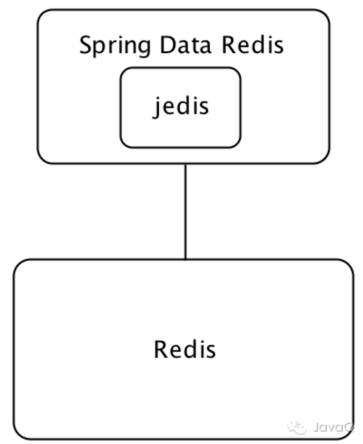引言
目前很多系统为了解决数据读写的性能瓶颈,在系统架构设计中使用redis实现缓存,spring框架为了让开发人员更加方便快捷的使用redis实现缓存,对redis的操作进行了包装。
0.缓存
个人理解的缓存是指用于存储频繁使用的数据的空间,关注点是存储数据的空间和使用频繁的数据。缓存技术,简单的说就是先从缓存中查询数据是否存在,存在则直接返回,不存在再执行相应的操作获取数据,并将获取的数据存储到缓存中,它是一种提升系统性能的重要方法。
1.redis
redis是一个开源的、内存存储key-value类型的数据结构服务器,可用作数据库、高速缓存和消息队列代理。它支持的数据类型有字符串、哈希表、列表、集合、有序集合等,同时通过redis sentinel提供高可用,通过redis cluster提供分区功能。
2.jedis
jedis是redis的java版客户端实现,也是官方推荐的java版客户端。它封装了对redis的各种操作,并且支持事务、管道及有jedis自身实现的分布式。
3.spring data redis
spring data是spring框架中的一个主要项目,目的是为了简化构建基于spring框架应用的数据访问,包括非关系数据库、map-reduce框架、云数据服务等,另外也包含对关系数据库的访问支持。
spring data redis是spring data项目中的一个主要模块,实现了对jedis客户端api的高度封装,使对redis的操作更加便捷。
4.关系图
redis、jedis、spring data redis三者之间的关系图如下所示。

5.spring cache
从spring3.1开始,spring框架提供了对cache的支持,提供了一个对缓存使用的抽象,通过在既有代码中添加少量它定义的各种 annotation,即能够达到缓存方法的返回对象的作用。提供的主要注解有@cacheable、@cacheput、@cacheevict和@caching,具体见表1。

@cacheable的常用属性及说明如表2所示。


@cacheevict的常用属性见表4。@cacheput的常用属性同@cacheable。

当需要在类上或方法上同时使用多个注解时,可以使用@caching,如@caching(cacheable = @cacheable("user"), evict = {@cacheevict("member"), @cacheevict(value = "customer", allentries = true)})
6.使用示例
下面使用spring data reds、redis和jedis实现一个简单的数据缓存。
1)依赖配置
示例使用了gradle,所以需要在build.gradle中加入如下依赖配置来管理所需要的jar。
|
1
2
3
|
compile "org.springframework.data:spring-data-redis:1.7.2.release"compile "redis.clients:jedis:2.7.2"testcompile "junit:junit:4.12" |
2)redis配置
示例连接的是本地的redis,redis.properties配置如下。
|
1
2
3
4
5
6
7
8
9
10
|
# redis settingsredis.host=127.0.0.1redis.port=6379redis.pass=redis.dbindex=0redis.expiration=3000redis.maxidle=300redis.maxactive=600redis.maxwait=1000redis.testonborrow=true |
3)spring配置
spring的配置文件如下。
|
1
2
3
4
5
6
7
8
9
10
11
12
13
14
15
16
17
18
19
20
21
22
23
24
25
26
27
28
29
30
31
32
33
34
35
36
37
38
39
40
41
42
43
44
|
<?xml version="1.0" encoding="utf-8" standalone="no"?><beans xmlns:xsi="http://www.w3.org/2001/xmlschema-instance" xmlns="http://www.springframework.org/schema/beans" xmlns:context="http://www.springframework.org/schema/context" xmlns:cache="http://www.springframework.org/schema/cache" xsi:schemalocation="http://www.springframework.org/schema/beans http://www.springframework.org/schema/beans/spring-beans.xsd http://www.springframework.org/schema/context http://www.springframework.org/schema/context/spring-context.xsd http://www.springframework.org/schema/cache http://www.springframework.org/schema/cache/spring-cache.xsd"> <context:component-scan base-package="redis.cache"/> <context:annotation-config/> <cache:annotation-driven cache-manager="rediscachemanager"/> <bean class="org.springframework.beans.factory.config.propertyplaceholderconfigurer"> <property name="locations"> <list> <value>classpath:redis.properties</value> </list> </property> </bean> <!-- 配置jedispoolconfig实例 --> <bean id="poolconfig" class="redis.clients.jedis.jedispoolconfig"> <property name="maxidle" value="${redis.maxidle}"/> <property name="maxtotal" value="${redis.maxactive}"/> <property name="maxwaitmillis" value="${redis.maxwait}"/> <property name="testonborrow" value="${redis.testonborrow}"/> </bean> <!-- 配置jedisconnectionfactory --> <bean id="jedisconnectionfactory" class="org.springframework.data.redis.connection.jedis.jedisconnectionfactory"> <property name="hostname" value="${redis.host}"/> <property name="port" value="${redis.port}"/> <property name="password" value="${redis.pass}"/> <property name="database" value="${redis.dbindex}"/> <property name="poolconfig" ref="poolconfig"/> </bean> <!-- 配置redistemplate --> <bean id="redistemplate" class="org.springframework.data.redis.core.redistemplate"> <property name="connectionfactory" ref="jedisconnectionfactory"/> </bean> <!-- 配置rediscachemanager --> <bean id="rediscachemanager" class="org.springframework.data.redis.cache.rediscachemanager"> <constructor-arg name="redisoperations" ref="redistemplate"/> <property name="defaultexpiration" value="${redis.expiration}"/> </bean></beans> |
4)service
示例代码的servicer如下。
|
1
2
3
4
5
6
7
8
9
10
11
12
13
14
15
16
17
18
19
|
@service("userservice")public class userservice { @cacheable(value = "user", key = "'userid_' + #id",condition = "#id<=110") public string queryfullnamebyid(long id) { system.out.println("execute queryfullnamebyid method"); return "zhangsanfeng"; } @cacheevict(value = "user", key = "'userid_' + #id") public void deletebyid(long id) { system.out.println("execute deletebyid method"); } @cacheput(value = "user", key = "'userid_' + #id") public string modifyfullnamebyid(long id, string newname) { system.out.println("execute modifyfullnamebyid method"); return newname; }} |
5)测试
|
1
2
3
4
5
6
7
8
9
10
11
12
13
14
15
16
17
18
19
20
21
22
23
24
25
26
27
28
|
@testpublic void test() { applicationcontext context = new classpathxmlapplicationcontext("rediscachecontext.xml"); userservice userservice = (userservice) context.getbean("userservice"); system.out.println("第一次执行查询:" + userservice.queryfullnamebyid(110l)); system.out.println("----------------------------------"); system.out.println("第二次执行查询:" + userservice.queryfullnamebyid(110l)); system.out.println("----------------------------------"); userservice.deletebyid(110l); system.out.println("----------------------------------"); system.out.println("清除缓存后查询:" + userservice.queryfullnamebyid(110l)); system.out.println("----------------------------------"); system.out.println(userservice.modifyfullnamebyid(110l, "zhangjunbao")); system.out.println("----------------------------------"); system.out.println("修改数据后查询:" + userservice.queryfullnamebyid(110l)); system.out.println("----------------------------------"); system.out.println("第一次执行查询:" + userservice.queryfullnamebyid(112l)); system.out.println("----------------------------------"); system.out.println("第二次执行查询:" + userservice.queryfullnamebyid(112l)); system.out.println("----------------------------------");} |
6)测试结果
输出结果如下。
execute queryfullnamebyid method
第一次执行查询:zhangsanfeng
----------------------------------
第二次执行查询:zhangsanfeng
----------------------------------
execute deletebyid method
----------------------------------
execute queryfullnamebyid method
清除缓存后查询:zhangsanfeng
----------------------------------
execute modifyfullnamebyid method
zhangjunbao
----------------------------------
修改数据后查询:zhangjunbao
----------------------------------
execute queryfullnamebyid method
第一次执行查询:zhangsanfeng
----------------------------------
execute queryfullnamebyid method
第二次执行查询:zhangsanfeng
----------------------------------
从结果可以看到,使用缓存后,第二次查询没有执行查询方法体,直接返回了缓存中的数据;清除缓存后,再次查询就执行了查询方法体;修改数据后,相应的缓存数据也被修改了;不符合缓存条件的数据没有被缓存。
以上就是本文的全部内容,希望对大家的学习有所帮助,也希望大家多多支持服务器之家。
原文链接:https://www.jianshu.com/p/0dbe0a616898

















